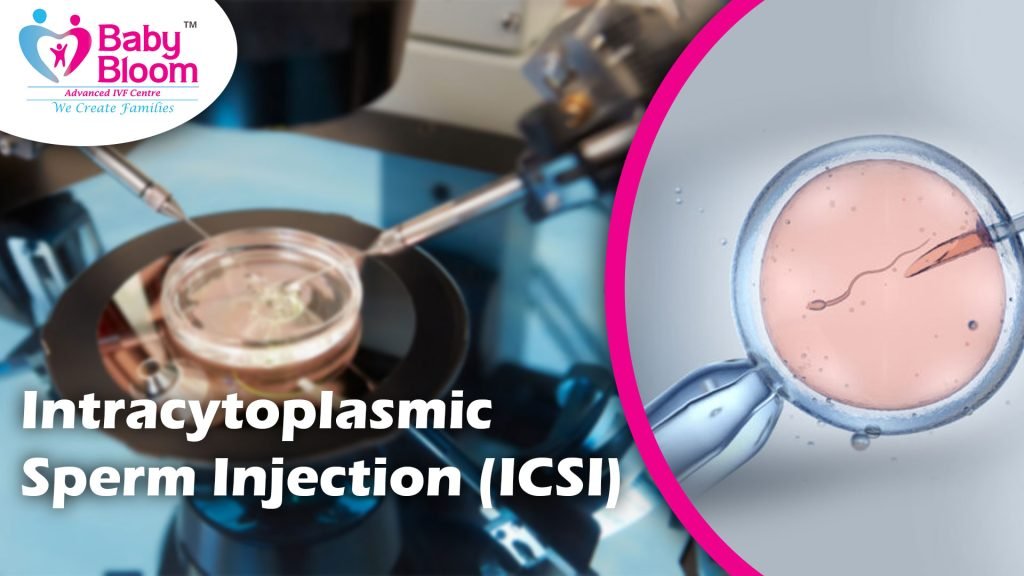Introduction to Intracytoplasmic Sperm Injection (ICSI)

Dr. Pujil Gulati, IVF Specialist with over 13 years of experience in Assisted Reproductive Techniques BabyBloom IVF Gurgaon
Infertility can be a challenging road for many couples, but advancements in reproductive medicine have opened up incredible possibilities. One such breakthrough is Intracytoplasmic Sperm Injection (ICSI), a specialized form of assisted reproductive technology (ART). This method has revolutionized the way couples facing severe infertility issues can conceive a child.

What is ICSI?
ICSI is a laboratory procedure that involves directly injecting a single sperm into an egg to facilitate fertilization. Unlike traditional in-vitro fertilization (IVF), which allows sperm and eggs to interact in a petri dish, ICSI takes fertilization a step further by manually overcoming natural barriers.
Overview of ICSI as an Assisted Reproductive Technology (ART)
Intracytoplasmic Sperm Injection is widely used for cases where traditional IVF methods may fail due to poor sperm quality or low sperm count. It employs advanced micromanipulation techniques to select and inject a healthy sperm directly into the egg.
Difference Between ICSI and Traditional IVF
While IVF relies on the sperm’s natural ability to penetrate the egg, ICSI eliminates the need for this process. This makes it particularly effective for couples facing male factor infertility or other medical complications that impede natural fertilization.
Why is ICSI Used?
Intracytoplasmic Sperm Injection is not just a go-to solution for male infertility; it also addresses other complex fertility issues.
Addressing Male Factor Infertility
Conditions like low sperm count, poor motility, or abnormal sperm morphology can make natural conception or traditional IVF challenging. ICSI helps bypass these hurdles by using a single, viable sperm for fertilization.

Other Medical Conditions Requiring ICSI
In addition to male infertility, ICSI is used for cases where the couple has experienced failed fertilization in previous IVF cycles or when eggs are retrieved through surgical means in women with compromised fertility
Evolution of Fertility Treatments
From the initial breakthroughs in IVF in the 1970s to the first successful Intracytoplasmic Sperm Injection birth in 1992, the field of reproductive medicine has grown exponentially. ICSI represents a significant leap forward in addressing severe infertility challenges
Milestones in the Development of ICSI
The development of micromanipulation tools and techniques paved the way for Intracytoplasmic Sperm Injection. Today, it is a routine part of many fertility clinics’ services, offering hope to couples worldwide.
FAQs
Q. What is the cost of ICSI treatment?
The cost of Intracytoplasmic Sperm Injection treatment in India typically ranges from ₹1,25,000 to ₹2,00,000 per cycle, depending on the clinic, location, and additional procedures required.
Q. How long does the Intracytoplasmic Sperm Injection procedure take?
The ICSI procedure itself takes about 4-6 weeks, including ovarian stimulation, egg retrieval, sperm injection, and embryo transfer. The actual sperm injection process lasts only a few hours.
Q. Are there any side effects for the mother undergoing ICSI?
Possible side effects for the mother include bloating, mild abdominal pain, mood swings, or ovarian hyperstimulation syndrome (OHSS). However, severe complications are rare with proper medical care.
Q. Can ICSI guarantee a successful pregnancy?
No, Intracytoplasmic Sperm Injection improves fertilization chances but doesn’t guarantee a successful pregnancy. Success depends on factors like embryo quality, maternal age, and overall health.
Q. Is Intracytoplasmic Sperm Injection suitable for all types of infertility?
No, ICSI is primarily used for male infertility issues, such as low sperm count or poor sperm motility. It may also be recommended for unexplained infertility or previous IVF failures.
Write your message:-

Social Media Links :-
Welcome to BabyBloom IVF, where your journey to parenthood is nurtured with care, expertise, and the latest advancements in fertility treatment. Located in the heart of Gurgaon, Babybloom IVF is the Best IVF Centre in Gurgaon & leading fertility center dedicated to helping couples achieve their dreams of starting or growing their families.
Contact Us
Address No.1 I, block, 189, near Baani Square, South City II, Sector 50, (Gurgaon) Gurugram, Haryana 122018
Address No.2 Babybloom IVF, Nursing Home, Civil Rd, Company Bagh, Rohtak, Haryana 124001

Brought Happiness to the world
@BabyBloom IVF All Rights Reserved @2025

